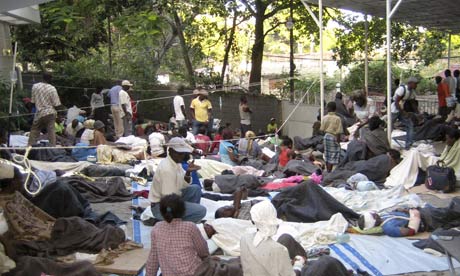Would aid flourish without religion? | The question | Comment is free | guardian.co.uk
If it weren't for organised religions, would there be as much humanitarian aid in the world? If not, why not?
 Médecins sans Frontières transformed their Port-Au-Prince offices into a makeshift hospital after the Haiti earthquake. Photograph: Médecins sans Frontières/AFP/Getty
Médecins sans Frontières transformed their Port-Au-Prince offices into a makeshift hospital after the Haiti earthquake. Photograph: Médecins sans Frontières/AFP/GettyWould humanitarian aid flourish without religion? In one sense, the answer is obvious. There are entirely secular organisations, like Médecins sans Frontières, or Oxfam, which function without any religious allegiance at all. Most successful charities in the west, whether they are religious or not, must stress that they are not biased in their giving if they hope to raise funds. Yet it is also true that religious networks are essential to the delivery of aid and education: the Catholic church runs a third of all the schools in Africa.
Organised religions are able to connect congregations in the developed world with their counterparts in the developing world and make both feel that they are part of the same great enterprise. As the (atheist) psychologist Jonathan Haidt has observed:
"In the US, religious believers give more money than secular [even] to secular charities, and to their neighbours. They give more of their time, too, and of their blood. Even if you excuse secular liberals from charity because they vote for government welfare programs, it is awfully hard to explain why secular liberals give so little blood."
Muslims are enjoined by their religion to give 2.5% of their income to charity and many do, while the rich, secular nations of the world struggle to give 0.7% of their GDP to foreign aid.
This isn't a question about whether believers are morally superior. But it does seem they find it easier to translate compassion into action. Is this really true, and if it is, what can the secular charities do to match them?

No comments:
Post a Comment